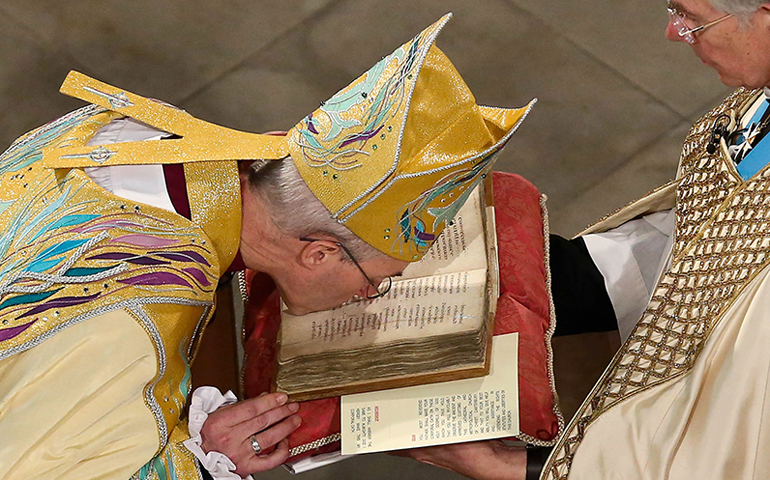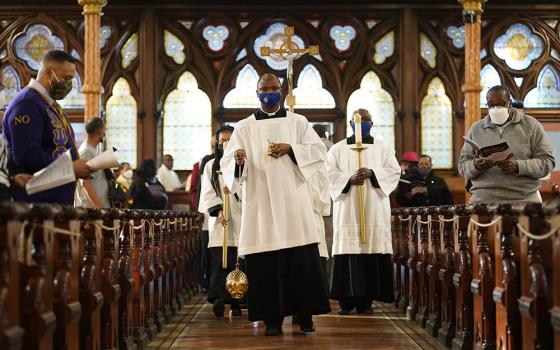
Archbishop of Canterbury Justin Welby, during his enthronement as the 105th archbishop of Canterbury, on March 21, 2013. (RNS/Courtesy Anglican Communion News Service/The Press Association)
After centuries of wearing flowing robes, cassocks and other vestments, Anglican priests can finally dress down.
Under canon law, clergy have to wear traditional robes when holding Communion services, baptisms, weddings or funerals. But following a vote this week at a gathering in York of the General Synod, the Church of England’s ruling body, Anglican priests can now wear lay garments such as a suit instead, so long as their parochial church council agrees.
The reasons given for the change included a more informal outlook in British society as a whole, but there is particular concern about young people being alienated by ornate accoutrements. One member of the Archbishop's Council — the archbishop of Canterbury’s cabinet — also wants the abolition of bishops’ miters.
Ian Paul, who writes the blog Psephizo wrote: "To most, and I would suggest especially the young, the sight of bishops in mitres puts them in another world. It is world of the past, a world of nostalgia, a world of deference — and mostly a world which is quite disconnected from present experience and values.
"It confirms for many the impression of a church irrelevant to modern questions, contained in its own bubble of self reference. And in its hierarchical understanding of authority, it is a culture of which contemporary society is becoming less and less tolerant."
The issue of young people's churchgoing is a disputed one for the Church of England, with many surveys showing a marked decline in membership of Christian churches among people below the age of 25. For some years now, the average age of a churchgoer has been over 60.
Last week, the Diocese of London launched new programs to get young people involved in the Anglican Church. Its research shows that there are fewer than 2,000 people between the ages of 11 and 18 attending services in the diocese, which has 500 churches and serves a population of 3.6 million people.
Now the diocese says it will try and attract more by bringing youth advocates to work with the clergy, recruit special youth ministers and provide them with specialist training, plant special youth-oriented congregations, and set up youth missions focused on the gospel. The aim is also, says the diocese, to find a way of "amplifying the voice of young people."
Linda Woodhead, one of Britain’s foremost sociologists of religion, said that while fewer children are socialized into Christian faith by their parents — and even of those that are, around 40 percent reject that identity — "younger people are not identifying as 'secular' either."
"Many are open-minded about religion, and appreciative of church buildings and other aspects of Christian heritage but suspicious of institutional religion," she said.
Woodhead said church initiatives over many decades aimed at attracting young people, mostly by way of targeted missions and youth work, have failed spectacularly.
"It's not inconceivable that new generations could be attracted back to Christianity, but it will require radical change in the nature of the churches themselves rather than yet another recruitment drive," she said.
Her research has showed that the churches' attitude toward gay people is the kind of approach that deters young people from traditional institutional religion, and for them no amount of clerical dressing down will change that.
But some evidence has emerged that contradicts the notion of decline.
A national survey carried out recently by the ComRes polling organization contradicted the notion that Christianity is on the wane among young Britons. It reported that 1 in 5 people aged 11 to 18 describe themselves as active followers of Jesus. Thirteen percent said they attended church.
Stephen Bullivant, director of the Benedict XVI Centre for Religion and Society at St. Mary's University, Twickenham, said that could be due to ethnic minorities and recent immigrants, among whom Christian belief remains stronger than in the majority white population.
He said his own analysis of government data indicates that the numbers of young people saying they have no religion at all appear to be stalling.
"You would expect it to keep going, but it hasn't," he said. "I wonder if everyone who is going to give up their Anglican affiliation has done so by now. We've seen a vast shedding of nominal Christianity, and perhaps it's now down to its hard core."

